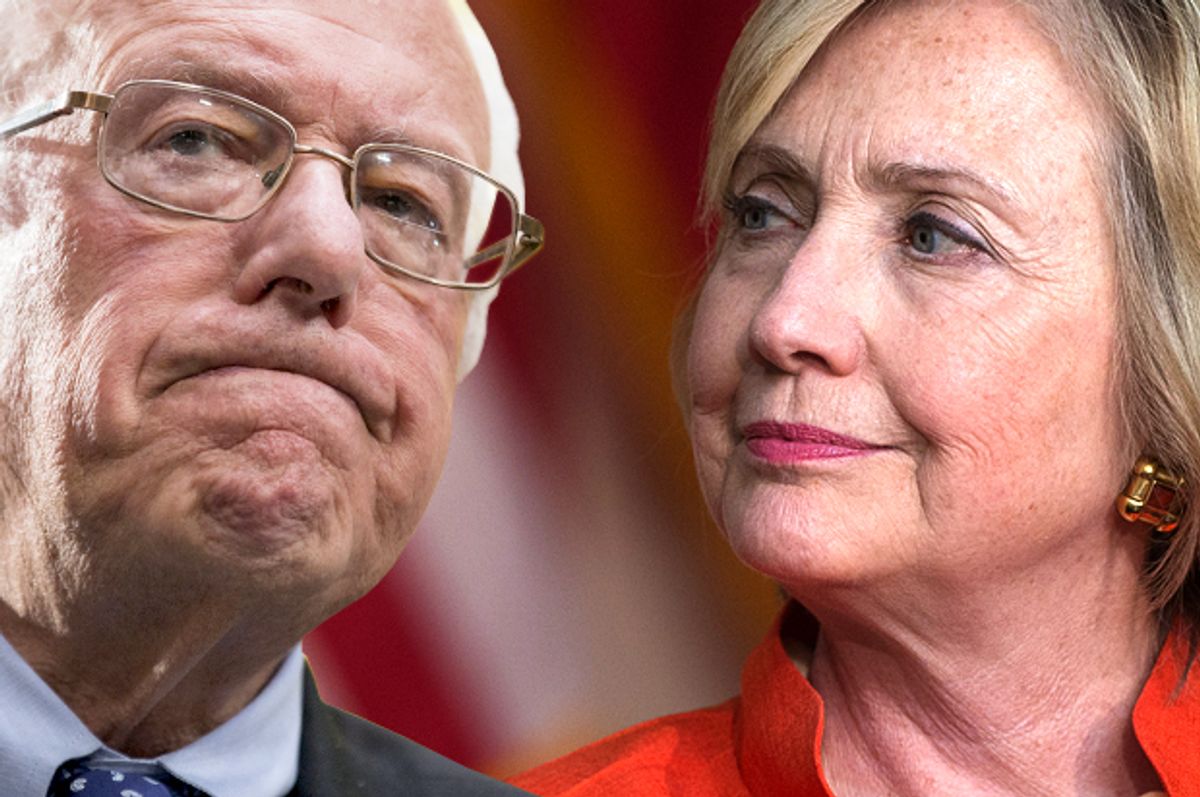This week Hillary Clinton showed us yet another spot where Democratic candidates playing the leftier-than-thou game will bump up against the boundaries of a political discourse shaped by almost 40 years of conservative efforts to demonize taxes and government, along with the fetishizing of deficit reduction that always seems to occur when a Democrat holds the White House. (See Bill Clinton’s presidency and the early years of the Obama administration.) It’s a fault line that runs through the Democratic primaries, and how both she and Bernie Sanders handle it will say much about both candidates’ viability in a general election.
It has been a given among political observers that Sanders’s entry into the primary would force Clinton to the left on some issues. Events seem to have played out that way, as Clinton has taken more progressive positions on the Keystone pipeline, the Trans-Pacific Partnership, and criminal justice reform, among others, since Sanders announced his campaign. By the same token, her less progressive positions – on a minimum-wage hike and health care – force Sanders to explain how he would accomplish massive increases in government spending without specifying just whose taxes he would need to raise by how much in order to pay for his agenda.
Yes, Clinton is triangulating, a word that meant something when her husband was the president in the 90s but is now overused to the point of meaninglessness. It’s a term I loathe because it frames every liberal policy as inherently good and every other position as bad, even if we’re not talking about something that is conservative per se, just somewhat to the right of the leftmost position. Clinton’s proposal for a $12 per hour minimum wage versus Sanders’s call for $15 an hour is a good example. If in the general she adopts the position of every Republican candidate that the minimum wage is the devil’s work, then she will be triangulating. Which, by the way, is something Republicans never get accused of because any deviation from conservative dogma is treated as apostasy. Rigid adherence to one position is bad for a political party in our system, as the state of the GOP today shows us. Much better to debate competing policies, but let’s not mistake arguing about degrees of a progressive policy for a dispute about what constitutes progressivism altogether.
This week’s example revolves around the candidates’ plans for health care. On Tuesday the Clinton campaign hit Sanders over the tax increases he called for in a 2013 Senate bill to move the nation to a single-payer system of “Medicare for all.” The bill called for a 2.2 percent across-the-board income tax hike and a 6.7 percent increase on employers. The Clinton campaign disingenuously called this a 9 percent increase on employees on the theory that employers would pass the cost down in the form of lower wages, but that was gilding the lily in a political discourse where the words middle class tax hike still cause politicians’ spines to turn into pudding. And for good reason, since polling indicates a vast majority of voters think the middle class is already paying either its fair share or too much federal tax.
Over at Slate, Jim Newell makes a strong case that the Clinton campaign’s timing of this attack is utterly bizarre, given that she will need Sanders’s supporters in a general election and this is an issue they care deeply about. But it’s not “red-baiting” to wonder how Sanders or any other president would pay for a single-payer system without middle-class tax hikes. Newell is right that refusing to hike taxes outright on incomes of less than $200,000 a year for singles and $250,000 a year for joint filers, as Clinton does and Obama did before her, is “policy-constricting.” But while polls do show that a single-payer system is popular with Democratic voters, I have yet to find the polls that show middle-income taxpayers are willing to pay more taxes in exchange for it, even if they understand that the trade-off is they will not have to pay for health insurance any more.
Basically, Clinton is betting that people want to hear that a president will put more money in their pockets, not that they are trading one expenditure (health insurance) for another (higher taxes to pay for, well, health insurance, albeit more comprehensive than what they get now in America’s patchwork system). In the normal course of electoral politics, this is a good bet to make, even in a Democratic primary. If it wasn’t, Bernie Sanders might be leading Hillary Clinton by 20 points, not the other way around.



Shares